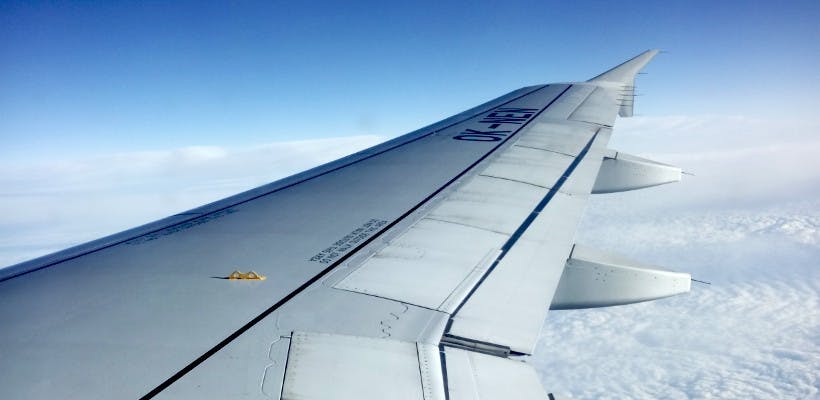Case Study - Slight Delay Caused Missed Connecting Flight

An interesting situation happened to me last week when I visited a printing office to pick up our latest posters for a purposes of our visit in Amsterdam. There was a young woman named Veronika standing next to me and when she spotted the poster she began asking me about the details of our project. It happened to me for the first time so I was very impressed by her interest and excitedly began talking. We discussed for more than ten minutes about ClaimAir and more importantly, about her real experience with airlines' common practices in relation to her recent delay and missed connecting flight.
This situation convinced me about the importance of sharing such case studies on this blog together with relevant analysis and clarification so if you have a story that is worth analyzing, send me an email -- jakub@claimair.com.
Veronika travelled from New York City (JFK) to Prague (PRG) with a layover at Paris (CDG). The first leg was operated by Air France while the second one by Czech Airlines with codeshare to Air France. The first flight to Paris was delayed just for 30 minutes so it wasn't anything serious until it caused that she missed her connecting flight to Prague. As a result, she must have paid for the alternate flight almost EUR 200 and arrived to her final destination with 11 hours delay. Surprisingly, in addition to her inconvenience and financial loss, her complaint was rejected by Air France with a reason that a minimum connecting flight needed for transfer at Paris wasn't kept.
Let's narrow the situation a little bit. The minimum connecting time is a term which is commonly used within the aviation industry. According to Wiktionary definition, it is the amount of time, agreed in advance between airlines and airport authorities, that is considered sufficient for a passenger to make a connection between an arriving and a departing flight. As far as I know, it's recorded within airlines' reservation and distribution systems and must be taken into account during a flight booking (the systems should take care of it automatically). Veronika told me that the booking was made via a website of Air France - in other words, it means that they were fully responsible for its correctness. I don't know exact details but in my opinion, there was a bug within Air France's reservation system which allowed her to finalize the booking although the minimum connecting time wasn't met. However, it doesn't limit their liability at all.
Conclusion 1
Despite the fact that the minimum connecting time wasn't met, it is the responsibility of Air France to maintain their systems properly in order to avoid wrong flight bookings. Therefore, the missed flight was a fault of Air France so the EUR 200 cost of the new ticket from Paris to Prague should have been completely refunded.
Regarding the delay, the situation is pretty clear. The flight was headed to the European Union with the European Union based air carrier so the Regulation (EC) No 261/2004 applies. For a long haul flight, which the flight from New York City to Paris certainly is, there is a limit of 4 hours delay stated by the legislation that triggers your right to care (refreshments, hotel accommodation, hotel shuttle etc.). However, the right to care wasn't the case as the delay on the departure was only 30 minutes. The crucial is the fact that as a result of the delay Veronika missed her connecting flight at Paris which caused the 11-hours delay at her final destination. An arrival delay isn't specified within the Regulation but is covered by a joint case-law Sturgeon vs. Condor Flugdienst GmbH and Stefan Bock and Cornelia Lepuschitz vs. Air France SA of the Court of Justice of the European Union which is considered as juridical precedent and specifies that passengers with arrival delay of more than 3 hours should be treated as follows:
Passengers whose flights are delayed may be treated, for the purposes of the application of the right to financial compensation, as passengers whose flights are cancelled and they may thus rely on the right to financial compensation where they suffer, on account of a flight delay, a loss of time equal to or in excess of three hours, that is, where they reach their final destination three hours or more after the arrival time originally scheduled by the air carrier.
Conclusion 2
In accordance with the case-law of the Court of Justice of the European Union, Veronika was entitled to obtain financial compensation amounting to EUR 600,- (the amount reflects her long haul flight).
Although I experienced flight delays and cancellations on my own, it's always very interesting for me to hear stories from the others. Unfortunately the resolution of Air France about Veronika's case isn't anything extraordinary and unique and you can read more about airlines' common practices in my recent post.
In fact, that's the main reason why I founded ClaimAir - to advocate air passengers' rights and to make flying the most convenient way how to explore the world. At last, of course, it's needed to mention and makes me proud that Veronika became our new user and I hope she won't ever experience anything similar to her Air France case.
As usually, please share with me your own experience through comments or contact me directly, I'll be more than happy to talk to you.